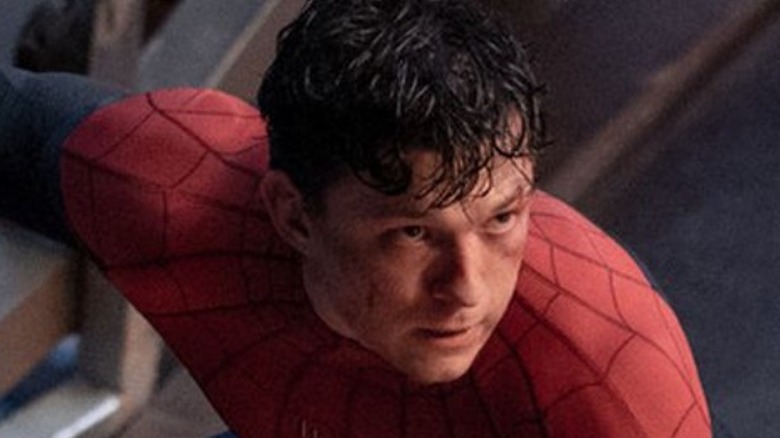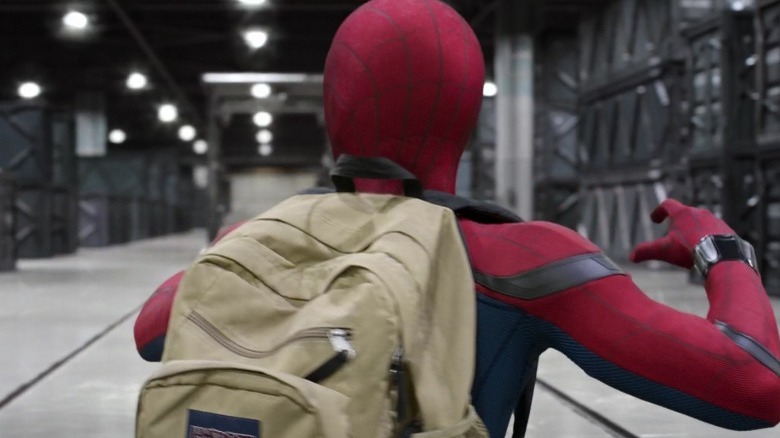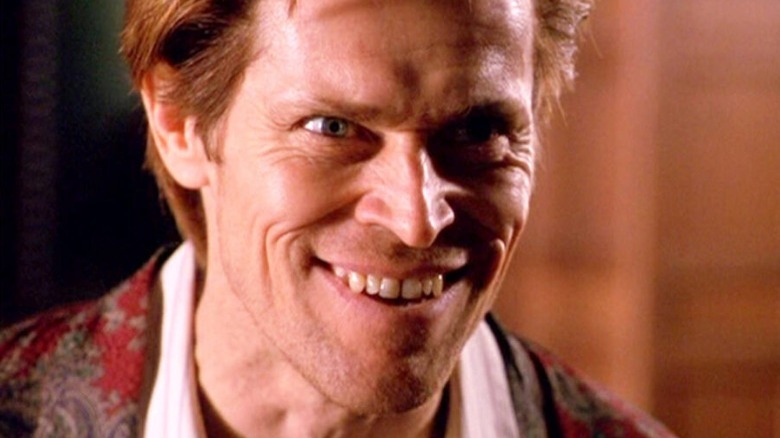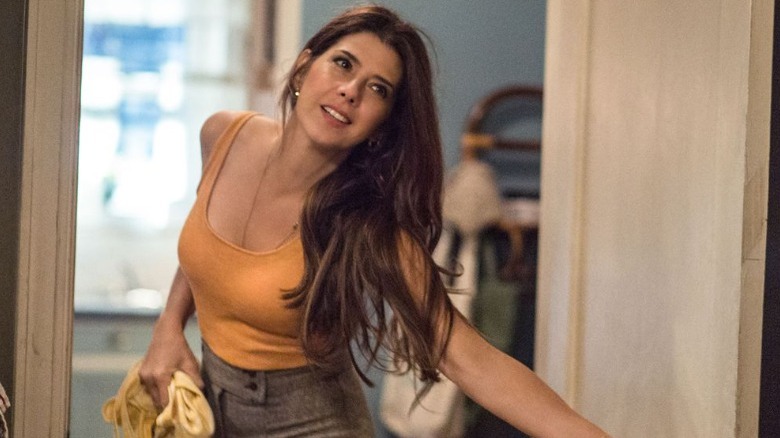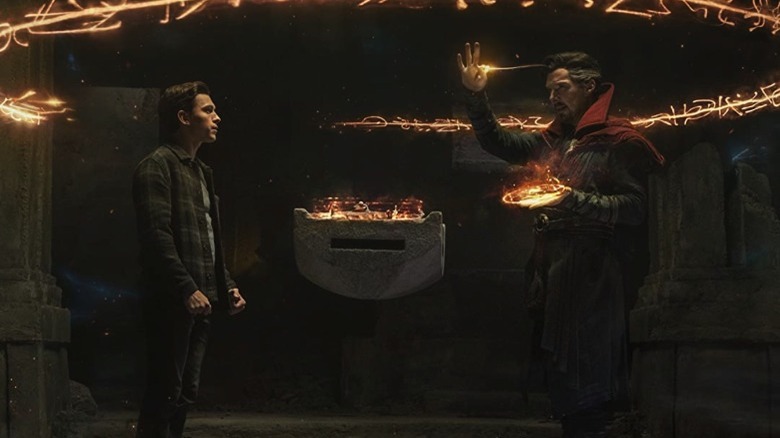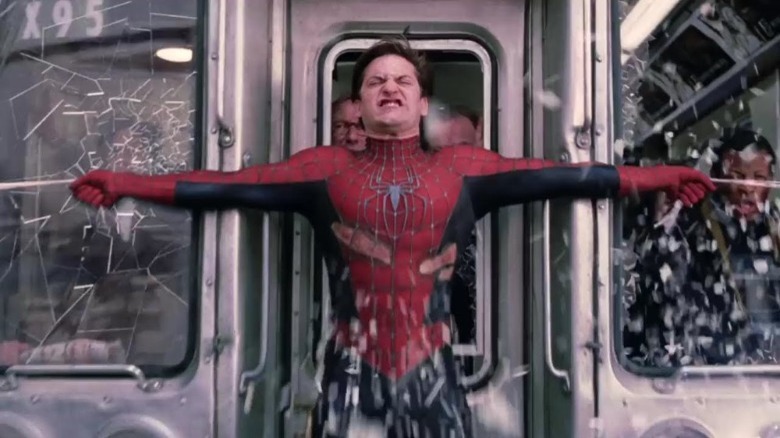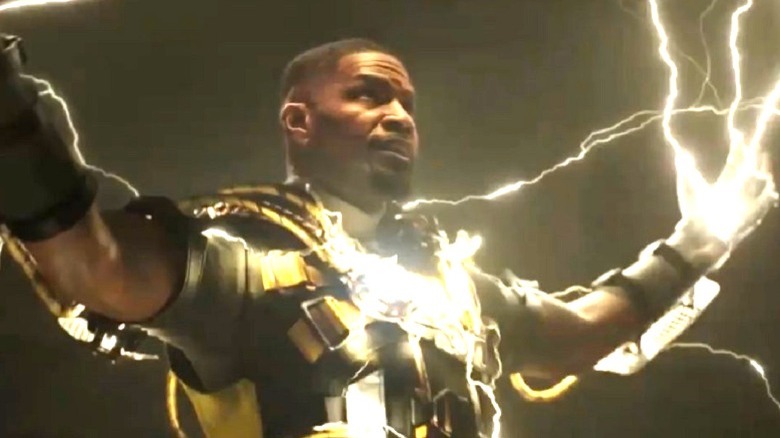Things Only Adults Notice In Spider-Man: No Way Home
Not to make you feel older, but the first Spider-Man movie came out nearly 20 years ago. Yep, Sam Raimi's "Spider-Man" is more than old enough to vote. And while the Marvel Cinematic Universe has fans of all ages, it likely has quite a few adult fans that are nearly 20 years older than when they first marveled at their friendly neighborhood screen.
As we've grown up with the movies, we've watched Spider-Man change as we've changed. First he was Tobey Macguire, then he was Andrew Garfield, and now he's Tom Holland. Some people might grow older and feel like they're too old for the MCU, others might double down and prize them as precious to their identity, and go after Martin Scorsese with a vengeance. Hopefully the majority of Spider-Man's adult fans view the MCU as the relatively reliable, entertaining but silly franchise that it is. But no matter what path your life has taken, there's no way you'll react to the new "Spider-Man: No Way Home" the same way as you did the first Spider-Man you saw in theaters.
For one, it's a multiverse-spanning intersection of all the Spider-movies that have come before it. But you're watching Spider-Man as a new version of yourself: older, wiser with any luck, less gullible but more discerning, perhaps smarter but less convinced that no one else is smarter than you. Here are the things adults notice in "Spider-Man: No Way Home." Bewarned as major and thorough spoilers follow.
College isn't that big of a deal
We pick up with Tom Holland's new, MCU timeline Spider-Man where we left off: Mysterio revealed his identity as Peter Parker to the world, causing all kinds of trouble. Without the resources of his mentor Tony Stark to insulate himself from the press, the public, and the law, Peter Parker finds his entire life upended by instant fame and infamy all at once. He's somehow cleared of all charges despite years of unlicensed vigilantism, but the final straw is when he's not accepted to MIT, and neither is his girlfriend MJ and best friend Nate by association.
It's a crushing blow, and the one that causes him to seek Dr. Strange's help and spur the action of the whole movie. But the mature members of the audience might ask: who cares? Not only is MIT's reluctance to admit Peter Parker, a known preternaturally brilliant teen scientist that also happens to be a world-saving hero, pretty unrealistic, the older you get you realize how overblown the importance of college is. As "the most famous person in the world," Peter Parker could likely find independent funding based on his web serum alone, go into business with his friends and hire world-class tutors if they want a specific education. Or just make like Mark Zuckerberg and skip the prestigious college, move straight to Silicon Valley and scam your way into some venture capital.
College isn't a scam necessarily, but it only gets you so far. Being Spider-Man is more than enough to get Peter to wherever he wanted college to get him. It seems impossible to believe as well that the college system would remain exactly the same in the post-snap world to begin with.
So now Spider-Man has to save bad guys too?
At a certain age, you just don't go to a Spider-Man movie to have to think hard about moral relativism. So a bunch of bad guys from alternate universes get sucked into Spider-Man's universe, many of them pulled over from a moment that they're about to die, so Spider-Man takes his Aunt May's advice and doesn't send them back so he can save them instead? What?
Setting aside the logistical questions about how that works (so they're cured when they get back, does that stop Green Goblin's glider from impaling him?), why should we be rooting for this to happen? Because Spider-Man is a good guy that doesn't send people to their deaths is a pretty reductive, sort of juvenile answer when it's already been established that their very presence threatens the stability of the universe they've shown up in, and the danger they pose to everyone around them before they're "cured." And it sort of undercuts our years and years of experience watching this Spider-Man and others battle various villains to the death, when apparently they could have just done some vague science stuff and cured them all along.
With great grief comes a lot more grief
One of the best running gags in the superb "Spider-Man: Into the Spider-Verse" is how every iteration of Spider-Man in that movie, when prompted to briefly summarize their origin story, begins with "All right, let's do this one last time..." Will we ever be free of it? Peter Parker gets bit, someone he loves dies as a result of his actions, someone says the line "with great power comes great responsibility," and then the story actually starts. It was refreshing when the MCU just kind of had Spider-Man show up, because we know the deal by now.
But "Spider-Man: No Way Home" heartlessly decides we need to pause the psychedelic collision of all past and present Spider-Man movies and plunge deep into the origin story again, this time by (second, irrevocable spoiler warning) killing our beloved Aunt May instead of the relatively anonymous Uncle Ben of origin stories past. Why? What lesson does Spider-Man learn from this? He's already been Spider-Man long enough to sort of get the whole power and responsibility two step, there and back again, and unlike the standard parable where Uncle Ben dies from Peter's own shameful selfish laziness Aunt May dies by the hand of someone she specifically made Peter promise to save?
It's honestly exhausting, after all of these Spider-years, which "No Way Home" specifically wants to capitalize on with it's applause-inducing reveals of other movies' characters, for it to ask us to deal with the same old origin story beats and also bid goodbye to Marisa Tomei. The scene when all three Spider-Man awkwardly grief bond bails it out slightly, but only just.
Worn-out disbelief suspenders
When the MCU started, it was set in a world that resembled our own. Tony Stark invented a new kind of power, and then nanotechnology, but these are reasonable leaps from the physics that we can get our heads around in reality. But bit by bit, we learn that Thor is a living god and there's a realm called Asgard, say, or we have to learn a lot of cosmology and alien species in "Guardians of the Galaxy," and by the time we get to today the Marvel Cinematic Universe is a huge spaghetti mess of time-travel-displaced copies of characters, insanely powerful magical spells, Infinity Stones, immortal robots, giant celestial beings, and basically a lot more exhausting chaos on top of which we now have to layer the concept of the multiverse.
Sometimes it requires let's say a younger person's enthusiasm to keep track of all of this, while simultaneously requiring a huge suspension of disbelief to accept all the new magic rules as "No Way Home" barrels along. Dr. Strange tried to cast a spell that would erase everyone's memory of Spider-Man's identity, but Peter caused it to backfire so exactly opposite that it went looking in other universes for other people who knew Peter Parker is Spider-Man, even though they knew a different Peter Parker? Okay, sure. And at the end, to rectify all this, Strange has to erase everyone's memory of Peter Parker anyway? Does it also erase past news stories and the entire internet? Also anyone from non-MCU Spider-Man movies was pulled in from another universe except J. Jonah Jameson?
At some point, it can be maddening to tell if you're being an old crank being hard on family friendly entertainment or being a genuine, astute fan of a movie that you're enjoying.
Spider-backaches
By far the most fun part of "No Way Home" is the hilarious, stuttering interplay between three versions of Spider-Man, all of which appear to have aged along with the actors that play their characters. Tobey Macguire's Peter has mellowed into early middle age, Andrew Garfield's is dealing with the more existential onset of your 30s, and Tom Holland's Peter needs their help to deal with some late teenage rage, justified though it may be. As they work on scientific villain cures and plan the big battle together, there are enough laughs for a sitcom pilot.
And weary backs that wish their owners had made the drive to the theater with the reclining seats everywhere saw a bit of themselves when Garfield and Macguire's Peters Parker bond over mutual lumbar pain. You get older and you hear that yeah, back pain happens to pretty much everybody, but it's oddly comforting to see two iterations of Spider-Man himself complain about "middle-back stuff." It's enough to make one grateful that their biggest issue is finding the right yoga class or standing desk, and not constantly sustaining body-blows from a super-powered rogues' gallery.
Bring your own easter egg basket
To be clear, it's not that you have to have seen and have a perfect memory of all previous Spider-Man movies to enjoy "Spider-Man: No Way Home," or follow what's happening necessarily, but for each movie that you haven't seen or don't really remember there are definitely a few things you'll miss. This is in addition to the umpteen MCU movies that "No Way Home" assumes you've definitely seen to understand the dynamic between him and Dr. Strange, and remember what the snap was, and so on. How many people actually saw "The Amazing Spider-Man 2," and will remember the history that Electro and the Andrew Garfield Spider-Man are talking about? After fourteen years we might need a little more than a line or two refresher on what Sand-man's whole deal with his daughter was in "Spider-Man 3."
Obviously, the MCU was built on a new strategy of connecting the movies in a larger universe, and it's worked to great effect, but each installment still has to serve as its own story. And that means that "No Way Home" depends almost entirely on your knowledge of other movies, because it gives little more than comic-relief service to the thoughts, feelings, and lives of the characters it pulls wholesale out of other stories. To put it another way, if comic book movies want to depend on our nostalgia so heavily, they could try a little harder not to make us feel like we haven't done our homework by watching them all.
If you're getting older, "Spider-Man: No Way Home" is the kind of commodified nostalgia product that is designed to make you feel the weight of your years, so it seems like rubbing it in for the movie to test your memory, too.
Stop holding us credit-hostage
If there's one crime the MCU has committed, it's the popularizing of the mid and post-credits tag scene. Let's say hypothetically you don't have the same bladder you used to, but now nobody stands up at the end of every action movie. It's unjust on some deep principled level as a moviegoer to have to do the "excuse me" squeeze-by when you made it through the entire movie to the credits. But like Pavlovian dogs, Marvel Studios has us trained en masse to wait for one or two more glimpses of what the future installments have to offer.
And to top that off, "Spider-Man: No Way Home" has a mid-credits scene with a fun cameo that's worth the wait, and then makes you wait alllll the way until the end for a teaser trailer for the upcoming "Dr. Strange in the Multiverse of Madness." It's not even a scene! Even by the logic of the MCU's credit-scene happy style, it seems criminal to make people wait until the very end of the "No Way Home" experience to see a trailer for a movie they already knew was coming and will definitely see anyway.
